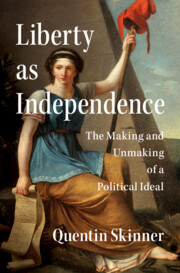Book contents
- Liberty as Independence
- Liberty as Independence
- Copyright page
- Contents
- Acknowledgements
- Conventions
- Introduction
- Part I Liberty and the Revolution of 1688
- Part II Liberty as Independence: The Ideal Entrenched
- Part III Liberty as Independence: The Ideal Betrayed
- 5 The Persistence of Dependence
- 6 The Continuing Use of Arbitrary Power
- Part IV A New View of Liberty
- Part V The Rival Views in Contestation
- References
- Index
6 - The Continuing Use of Arbitrary Power
from Part III - Liberty as Independence: The Ideal Betrayed
Published online by Cambridge University Press: 23 January 2025
- Liberty as Independence
- Liberty as Independence
- Copyright page
- Contents
- Acknowledgements
- Conventions
- Introduction
- Part I Liberty and the Revolution of 1688
- Part II Liberty as Independence: The Ideal Entrenched
- Part III Liberty as Independence: The Ideal Betrayed
- 5 The Persistence of Dependence
- 6 The Continuing Use of Arbitrary Power
- Part IV A New View of Liberty
- Part V The Rival Views in Contestation
- References
- Index
Summary
Chapter 6 turns to the attack on the Whig view of the state, and especially to the rejection of the Whig contention that no arbitrary or despotic power is any longer being exercised. The chapter focuses on two major challenges to this complacency. One line of criticism pointed out that, with the creation and rapid growth of the national debt, enormous sums were now being paid directly to the crown, thereby bringing an obvious danger of despotism. The second and epoch- making challenge came from the American colonies. When the British government resolved in 1764 to tax them directly, the colonists denounced this innovation as an obvious act of despotism. They argued that, because they had no representation in the British Parliament, they had no means of expressing or withholding their consent. They were thus being subjected to a wholly arbitrary form of power, and were consequently being treated as slaves. The chapter traces the development of this patriot case in the writings of Otis, Hopkins, Dulany, Dickinson, Jefferson and other colonists, and concludes with the defence of the patriot cause by Price and Paine and the publication of the Declaration of Independence.
- Type
- Chapter
- Information
- Liberty as IndependenceThe Making and Unmaking of a Political Ideal, pp. 141 - 170Publisher: Cambridge University PressPrint publication year: 2025

